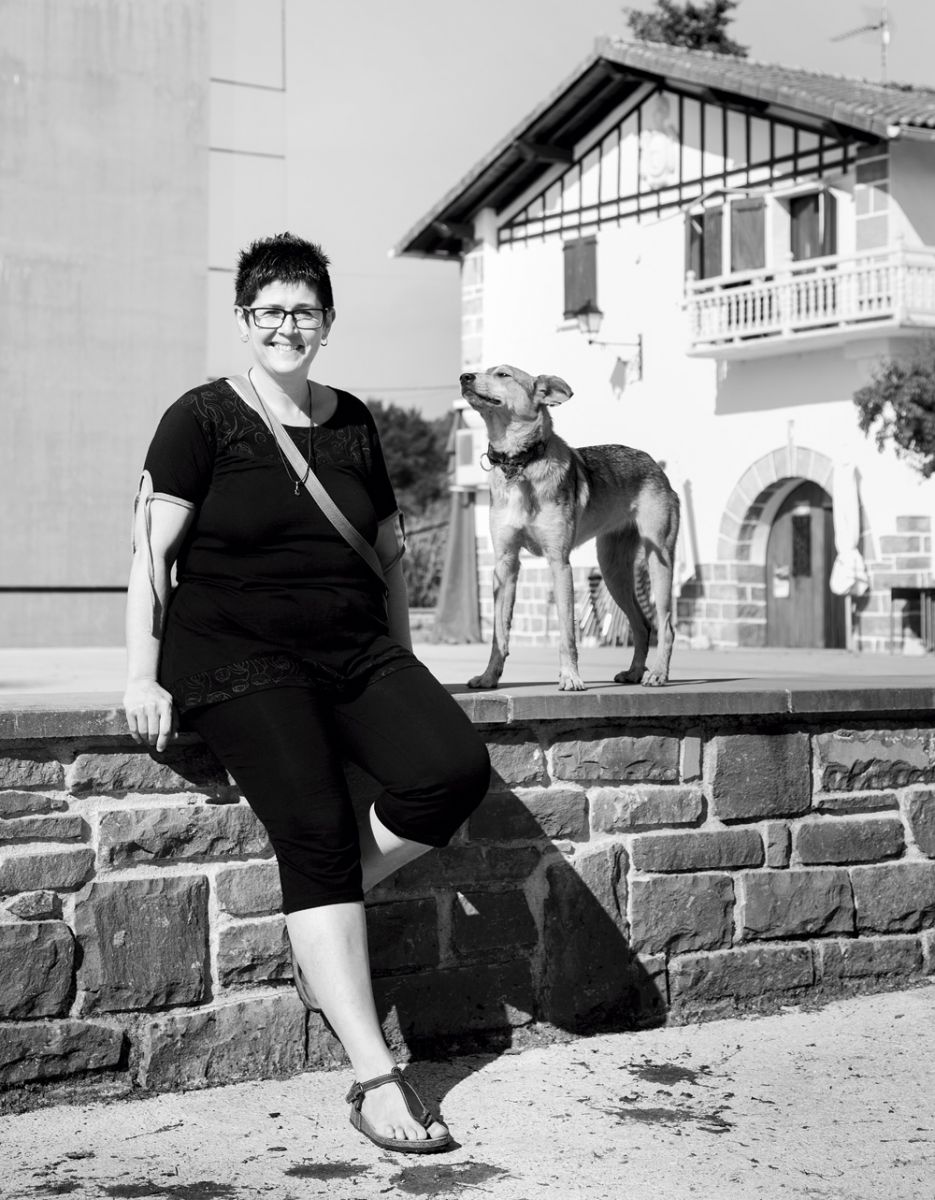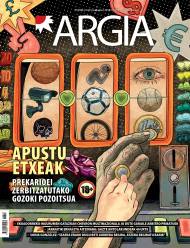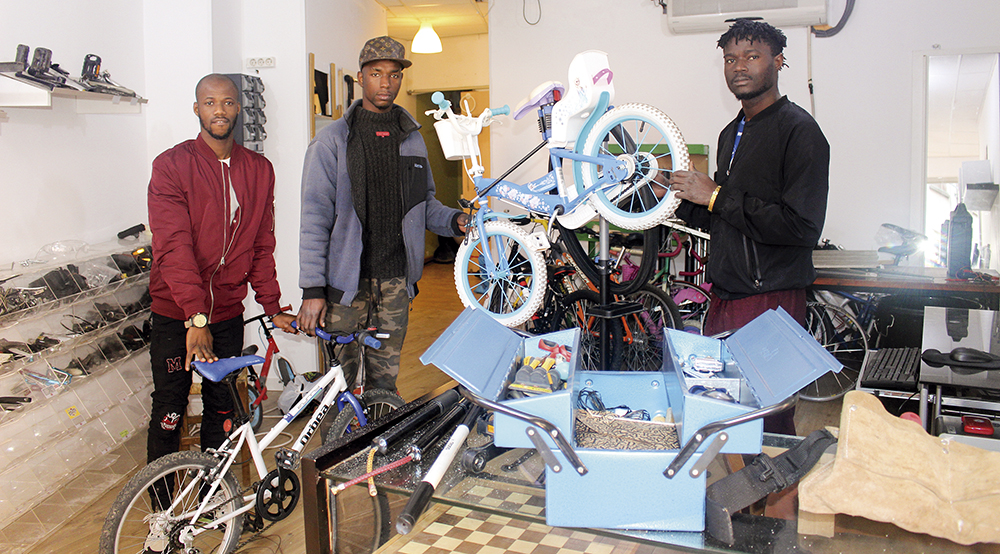"It's not a co-op for women, but our way of doing is especially attractive for women."
- When he was 19, he left home. The parents hadn't been very alarmed, because he was the youngest of the seven siblings. Since then it has been said that he swam, walked and flew like a duck. The cheese factory of one, the cooperative Ernaizu of the other, the escape games room… It lives in the quiet valley of Basaburua, of 850 inhabitants, a nonsense that does not stop to think about what new projects are going to be put in place.

Hiria utzita, gaztetan herri txiki batera bizitzera joan zen, Ultzamara lehenbizi, Basaburura gero. Sukaldaria izan da, euskara irakaslea, gaztagilea… Basaburua ibarreko Ernaizu kooperatibako sortzaileetako bat da. Duela bi urte Espainiako Estatuko Nekazaritza Ministerioak Berrikuntzaren Bikaintasuna saria eman zien. Orain turismo eskaintza berri bati heldu diote: escape room jolasak Orokieta herrian eta bailaran.
What do you work on?
The truth is that I find it difficult to answer that. For a while it was easier for me because I was a chef or because I was a professor at AEK, but that was in a short time. In most cases I have been creating and managing new projects. Of course, what I love most is starting new projects, so I say I'm a pretty compulsive entrepreneur.
Being from Pamplona, why did he come to Basaburua?
It was very clear that I wanted to go and live in a small town. When I was 19 years old I left home and with 21, two other girls I met in a boarding school, I went to live in the town of Iraizotz, in Ultzama. I'm the youngest of the seven siblings, and my parents weren't scared. Then I spent a couple of years in Anue. At that time, when I was doing a pottery course in Basaburua, I found out that one of them had to sell the house. So my partner and I went to the Udabe mill.
Then I saw that I could live and work here. They rented a cheese shop and we took it. We were small on the street, but we learned to make cheese with a lot of hobby and also the issues needed to run the business: accounting, sales techniques… We wanted to boost local production. Next to us we had one of the few farmers who produced organic milk in Navarre, and as I sold it to Danone and mixed it with everything in the tank, we thought that couldn't be the case and we started making dairy with that organic milk. We market dairy products under the name of Basakaitz. I left the cheesemaking, but others go ahead.
How did the Ernaizu cooperative emerge?
When we were in the cheese shop, we got the chance to stay in Aizaroz. It is a new town and the City Hall decided to create the house of culture and underneath the bar. It seemed to me a good opportunity to integrate the village into the valley and bring it closer to the village. The truth is that I wanted to separate myself from the cheesemaking, because there the family and the work, that everything was at once, was too dense.
I soon saw clearly that more services and jobs were needed in the valley. I began to share that thought with others, and so came the idea of cooperating. Shortly thereafter, the Development Committee of the City Hall presented the project to open the bar and shop in Apeztegiberri de Jauntsarats. A service station in the center of the valley. It was perfect for us. We presented ourselves to the auction in 2011, and since then we have been there. This is how the Ernaizu cooperative materialised. At first we were three women and more people have been coming in who are in line with our principles. I've been very lucky in the workplace, because I've always been touched by being surrounded by good people.
What's Ernaizu like?
It's a social initiative cooperative. We don't distribute profits, we don't generate profits, but if we have them, they would invest in the cooperative. The aim is to activate economic activity in the Valley, creating services and jobs. Our philosophical axis is to make work compatible with life care. We have flexible days and we give it priority. In addition, we want to promote Euskera and the care of culture, as well as cohesion between peoples. We are eight members and so many other workers. These are mostly young people in the area who need a small number of hours of work. It was also a surprise to us. At first we saw conciliation only from the point of view of care, but we realized that the young people who come to us seek conciliation with their studies. Providing an adequate response is very important in rural areas. If the people who are going to study find out the little weekend work that they need to move on, they stay out, while if they find it in the village, they will become more easily rooted. Young people are very grateful for that.

Are you all women?
Yes, except one.
And that?
It is not a cooperative for women, what happens is that our approach and our way of doing attracts women in particular.
The emotional aspect is much stronger in the things that we women have done, and that is conveyed in our business. Entering the world of emotions is not attractive to many men and much less in the world of work…
Do you consider your physical condition, your menstrual condition, for example?
I think that is very important and that is what we should turn to. The important thing is to meet the needs of customers in the provision of their services, and if we have the flexibility to adapt to it, better.
Each month we draw up a timetable and take into account all the special requirements that may exist. Accordingly, we set the schedule and the distribution of work, but there are no problems in making unexpected changes. That's why we all try to know a minimum of all the jobs we have.
When drawing up the calendar, we take very much into account the after-school activities of children, the mother's doctors, and also our accounts, of course, because in addition to work and care we have our lives. It has never happened to say no to a colleague because no one can replace him.
What can be found in Apeztegiberri?
Accommodation and shop. We also give meals, and you can say it's almost a civic center. Basaburua has 800 inhabitants a week and more during the weekend. To buy something first, people had to go to Irurtzun, Lizaso or Lekunberri. Minimum 30 kilometers round-trip. In our house you can find things that are in a normal grocery store and we always try to prioritize local and ecological products.
And who are the customers?
Men's crews come for lunch, parents who bring their children to class, those who come to the shops and, being on the road, so do many people from outside. We also do the function of tourist office. We also get cyclists, because it's a very comfortable place to stay, and you can also have it in sight, leaving the bike out. They say that we treat them very well, among them the question opens up and we have crews and crews. In summer, on the other hand, children and young people often come. The catwalks are in the river, in a natural pool, and the kids playing there come to Apeztegiberri to look for chores and ice cream. Always a very intense atmosphere.
It is the nerve centre of the Jauntsarats Valley, where there are pharmacy, school, health centre and City Hall. That is why they thought it was important to have a meeting point like this, and I believe that we have succeeded.
What do you think about the future?
We'd like to organize a kitchen and a transformation room to make preserves. We would like to organise the service of school canteens in the area using local products. It would drive local production. If they are subsidies, most of the capital would have to be provided by us. That's our star project.
"We have to be clear that we have to integrate tourism and that, although it is essential, it is not everything. It cannot be the only solution for the future"
In October 2016 they gave you an important prize for rural women in Madrid.
The Ministry of Agriculture awarded us the prize for Excellence in Innovation. We started to feel our recognition. That same year we received the mention of the Basanderea women's association in the valley. I've always believed in this project, but some of my colleagues still struggle a little bit. "A prize in Madrid? But we do txistorra pintxos!” they say.
It was a very nice experience. We were told that the plane was going to be paid to one person, but we told them it was a team job and that, as more people wanted, we preferred to change the airline ticket to a bus. And so it did. There it was us, our families, some clients… with the “Euskaraz bizi nahi dut” T-shirts, with the other Basaburua group T-shirts… it was very nice.
Did you think about opening an escape room soon after?
Yes, in Orokieta. It's a very nice village. A couple of years ago, the accommodation was closed and we saw that there were many things to do there. At that time I met the escape room games and I also became fond. I like watching movies, but being in such a game is like living those stories. Thus emerged the game “The One Who Has Name”, a game related to the identity of this valley that gathers witchcraft, mythological beings and mystery.
What response have you had?
Very good. There are crews, families and lots of couples. That's why we came up with another one. “The challenge of Amalurra.” This is done outside, not inside a room. It's a blend of ginkana and room escape. Escape nature is what we call ourselves. From Jauntsarats, people travel four villages without a time limit to unravel mysteries. We set in motion in the spring and soon realized that children also deserve something for them. Thus emerged the “Message of the Basajeinus”, a game of tests for adults and children to be made together by the people of Orokieta.
We make a very good assessment. They are very suitable for the rural environment, among other things because it proposes games related to the native nature and culture, and that's what people are asking for, not as an aseptic issue in the city.
Is it part of active tourism?
Yes. In addition to nature and peoples, activities must be offered. A lot of people, especially in cities, are looking for something to pay when they leave the house.
In any case, we must be clear that tourism must be integrated and that, although it is essential, it is not everything. It cannot be the only solution for the future. We have to promote our resources, our human capital. In Basaburua, for example, the City Council has produced a guide for professionals and services, and it is very practical. People who live or have lived in cities are not aware of the importance of good land management for everyone. More resources, more money needs to be entered to stop people in the camp.
Escape room games are very fashionable.
A lot of it, and in companies, they're also used a lot for group dynamics and for analyzing people's behaviors. That is precisely the new line I want to open now in the Kili-kili amusement park in Iruñea.
Is it developing outside the school year?
Yes. The Ernaizu project has materialised and, although I have not completely abandoned it, at the moment it seems to me that I can have the opportunity to do other things. I have shortened working hours and I have just taken over the management of that amusement park in the Rochapea that my brother has been carrying so far. Something can be done for young people by taking advantage of the structures here. The game is designed and we will start it soon. We are also preparing something for adult groups and we intend to offer it to companies.
Never resting?
When a project comes to you, there's a kind of falling in love. I've learned to leave things for your moment. Swimming, flying and walking, I do everything, but like ducks.
What is it like to live in a small village for a street child?
Even though there are more advantages in daily life, you also find difficulties. Everything is more uncomfortable. When you do the shopping, for example, you notice a lot. If you need something last minute you don't have a Chinese store under your house. You need the car for everything. That anonymity you have in the city is not either.
On the other hand, as far as relations are concerned, in the villages people do not understand the city council or the council as an external institution, but I can demand what I want. The concept of auzolan is also held by the people, more than us, even if it is lost. They understand that what's there is like me and that it's getting a lot of hours and breaking its head for everybody's sake. In general, things are asked for and proposed with more respect. It may be my experience, but that's what I see.
There is respect among the countrymen. Despite the disturbances between them, when the parties arrive, they already know how to be next to each other, respecting others. “You are also from here, like me, and you have the same right to be here even if it’s my enemy.” That attitude has very good differences because you become more tolerant. That has been, at least, my process. That has cost me, but I have succeeded.
People live here quieter, yeah, right?
It depends on its nature. Stress is a consequence of mismanagement of duty. There's more work in the village than in the city, but here they participate in their lives and not just as a way of making money. There's not so much noise or so much haste. People move smoother and that's also transmitted. However, people with a tendency to stress walk in the same way as people or cities.
For children, surely, the village is the best. Here they grow freer and more independent. For their development it is very good to touch the land and the leaves, to dirty them… However, they have the need and desire to meet more people at an age.
Ikerketa parte-hartzailea eta gogoetatsua bultzatzen du Biharamunen Lantegia kooperatibak, eta zientzia eta ikerketa herriarengana hurbiltzeko lan egiten du. Duela urte eta erditik egoitza Bidarten dauka, eta Institut Curie-rekin elkarlanean Iker Herria ikerketa zentroa sortzeko... [+]
Hondarribiko Agroaldean Udalak utzitako lursailetako bat ustiatzen du 2015az geroztik, baina orain arte barazki ekologikoak kontsumitzeko hautu pertsonala zena, jantoki kolektiboetara eramateko proiektu berritzailea aurrera eramango dute, izan eskola, zahar etxe eta bestelakoei,... [+]



















